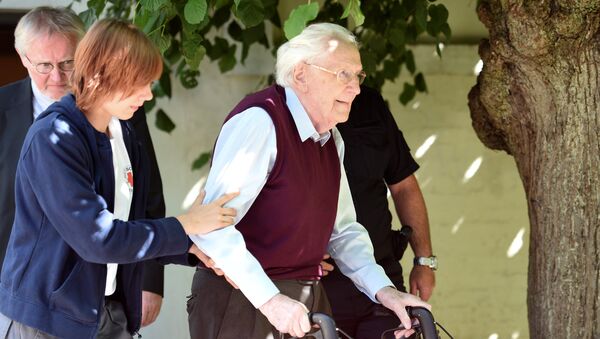On Monday, the Justice Ministry of Lower Saxony announced that Groening, who had been sentenced to four years of imprisonment in July 2015 for his involvement in the deaths of 300,000 people in the Auschwitz concentration camp. However, he has not yet served out his sentence due to a dispute about his health.
READ MORE: Lawyers of 96-Year-Old 'Bookkeeper of Auschwitz' Appeal Against His Imprisonment
According to the Norddeutscher Rundfunk broadcaster, the rejection of the clemency plea makes the likelihood of Groening serving a real prison term more probable.
Groening served as accountant of the concentration camp's administration in the rank of Unterscharfuehrer. He registered the money that was taken from the prisoners upon their arrival to the camp. Throughout the investigation, Groening repeatedly admitted to the moral guilt for the murders.
CELEBRAMOS que el Tribunal Constitucional de #Alemania 🇩🇪 autorice el ingreso del criminal nazi Oskar Gröning, a pesar de su avanzada edad. Los crímenes de lesa humanidad son imprescriptibles y este genocida estuvo relacionado con el asesinato de 300.000 seres humanos. pic.twitter.com/NEFht0Gdwb
— Fundación Internacional de Derechos Humanos (@Declaracion) 31 декабря 2017 г.
TWEET: WE WELCOME that the Constitutional Court of #Germany authorizes the admission of the Nazi criminal Oskar Gröning, despite his age. Crimes against humanity are not subject to statute of limitations and this genocidal act was linked to the murder of 300,000 human beings.
In November, a court in Lower Saxony ruled that Groening's medical condition would allow him to serve a prison term. The court specified that the state was required to treat all convicts equally as well as ensure the operation of state institutions. Groening's special needs could be taken into account, the ruling added.
Auschwitz-Birkenau was the largest extermination camp during the Second World War and has become one of the main symbols of the Holocaust. According to some estimates, 1.4 million people, 1.1 million of whom were Jewish, were killed in the camp between 1941 and 1945. The camp was liberated on January 27, 1945 by the USSR's Red Army.


